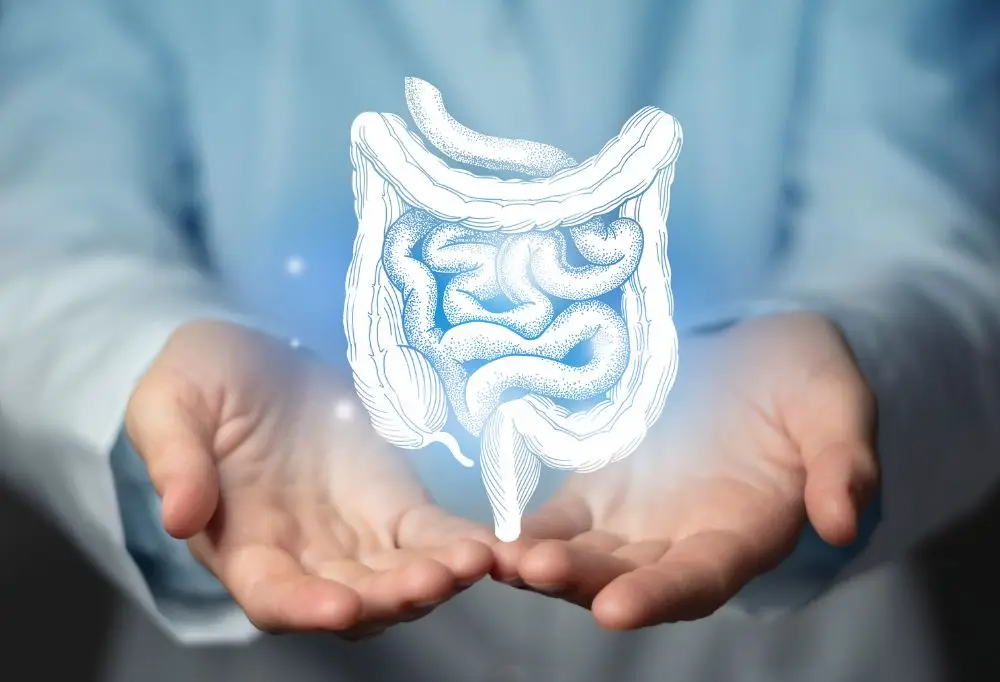Reviewed by Leigh Ann Scott, MD of Forum Health Las Colinas
What is the Gut-Hormone Connection
Gut Health and Hormones — are they related? Recent studies are making it more and more clear that the state of your gut, healthy or unhealthy, has a definite impact on your hormone levels and imbalances.
The strength of your immune system is largely determined by the healthy state of your gut. The immune system doesn’t just ward off colds and flu; it’s the gatekeeper for overall health. The state of gut health affects almost every physiological process in the human body. An unhealthy gut causes hormonal disruptions and chronic inflammation which can precede serious diseases such as diabetes, depression, cardiovascular disease, autoimmune disorders, cancer, and even Alzheimer’s.
What Exactly is the “Gut”?
The human body has more bacteria cells than any other type of cell. Most of these microbes (bacteria) reside in the gut. Most times when people think of the “gut,” they think of it in terms of having a “gut feeling” or following their “gut instinct.” There’s actually some physiological truth to that because the gut is connected to the brain with thousands of nerves.
The “gut” actually consists of the entire digestive tract from your mouth through to your colon, containing some 10-100 trillion symbiotic microbial cells. These microbes are referred to as the gut microbiome. Functions of the gut include taking in and processing nutrients and defending against harmful agents. The gut is made up of all different types of bacteria, some good or “friendly”, and some bad, as well as viral, fungal and other microbes. Without the microbiome, we would not be able to survive.
The more good bacteria there are, the healthier we are. When the gut becomes imbalanced and has too many bad or harmful bacteria or an overgrowth of fungus, hormonal disturbances, inflammation, and other processes take place which can lead to serious disease. So gut health and hormones are very definitely connected.
The wall of the gut is permeable which is how nutrients from food are able to pass through to the rest of the body and sustain our lives. If we are eating healthy foods and practicing good lifestyle habits, then the microbiome does its job effectively. However, factors such as eating the wrong foods, taking antibiotics, not managing stress well, and not getting enough sleep can throw the microbiome out of balance. The harmful bacteria become more prevalent and this creates problems.
Causes and Symptoms of an Unhealthy Gut
The biggest cause of an unhealthy gut is eating a diet high in sugars, processed foods, the wrong kinds of fat, and alcohol. Over time, not only does the gut not absorb nutrients as it should, but it can also leak toxins and harmful bacteria into the body. This is known as endotoxemia, or “leaky gut.” Antibiotics can also throw off the microbiome balance since they do not discriminate against beneficial versus harmful bacteria and will kill everything, particularly when used often or for an extended period of time.
Chronic gut issues often present with symptoms or conditions such as:
- Bloating/Gas
- Diarrhea/Constipation or alternating bouts of both
- Acid Reflux
- Food sensitivities
- Sugar Cravings
- Skin rashes/Eczema
- Depression/Low mood
- Brain fog/Memory issues
- Vitamin D3 deficiency
- Vitamin B12 deficiency
- Autoimmune disorders
- Compromised immune system
- Hormonal imbalances
- Chronic inflammation
- “Leaky Gut” Syndrome
- Obesity
Chronic Dysbiosis (the imbalance of healthy to unhealthy bacteria) eventually leads to more serious issues such as Hypothyroidism, Fatty Liver Disease, Type-2 Diabetes, Chronic Fatigue Syndrome, Fibromyalgia, and many other autoimmune disorders. Complications can also lead to life-threatening illnesses like Cardiovascular Disease and Cancer. It becomes a vicious cycle because when the gut is sick, it causes hormonal imbalances which affect just about every system in our body. It also leads to chronic inflammation which is a precursor to hundreds of diseases.
Gut Health and Hormones
There is a link between the health of your gut microbiome and hormones. When gut health isn’t optimal, hormones become imbalanced. For example, there is new research showing that the microbiome plays a big role in estrogen regulation. These studies indicate that poor gut health increases the risk of estrogen-related diseases such as PCOS, endometriosis, and even breast cancer.
Scientists know that 95% of Serotonin is produced and stored in the gut. This is why people with unhealthy microbiomes also often experience feelings of depression and anxiety.
An imbalanced gut microbiome is also one of the causes of a low-performing thyroid, also known as Hypothyroidism. Symptoms of this include chronic fatigue, weight gain, and hair loss.
Insulin is in part regulated by Lactobacillus reuteri which is stored in the gut. With inflammation being a key symptom of an imbalanced microbiome, a deficiency of this beneficial flora makes it even worse.
Vitamin D3, which is a precursor hormone, is not absorbed well by the body if gut health is not optimal. This vitamin is crucial to health on many levels and chronic deficiencies lead to a host of other problems.
Gut health also influences healthy cholesterol levels. These are precursors to maintaining a balance of Progesterone and Estrogen.
Gut Health Testing at Forum Health
We take a science-based, holistic approach to determine exactly what is causing your gut to be sick. Testing can be done to determine whether or not you are absorbing nutrients like you should be or whether or not you have any food sensitivities. We also offer testing which can give a comprehensive view of your gut health.
How to Improve Gut Health and Hormones
- Eat a nutrient-rich, anti-inflammatory diet. Click here for more information about which foods have anti-inflammatory properties.
- Consume probiotics regularly. Probiotics contain living, healthy bacteria, and ingesting them through food or drink immediately improves the balance of friendly flora. These are found in foods like yogurt, sauerkraut, kefir, kimchi, and kombucha. You can also take a high-quality probiotic supplement. Not only do probiotics increase healthy bacteria numbers, but they also help prevent diseased bacteria from sticking to the intestinal wall.
- Feed those friendly florae by eating foods containing prebiotics. Just as the bad bacteria thrive on sugar, prebiotics feed the good flora which allows them to stay healthy and multiply. Fibrous vegetables and fruits are the best sources for prebiotics. They are especially high in green bananas, pistachios, asparagus, garlic, onions, oats, quinoa, millet, and chia seeds.
- ELIMINATE SUGARS, simple carbs, and trans fats. This is one of the most important things you can do to restore gut health.
- Take antibiotics only when absolutely needed. Antibiotics can throw your gut flora out of balance since they don’t discriminate when killing bacteria. Always take a probiotic along with your antibiotic to help restore health and double up on probiotics as soon as you are done taking your antibiotics.
- Eliminate artificial sweeteners. Studies have shown that sweeteners like aspartame stimulate the growth of harmful bacteria in the gut.
- Consume polyphenols regularly. These are plant compounds found in red wine, green tea, dark chocolate, and olive oil and they stimulate the digestive system.
- Drink more water! Water benefits the lining of the gut and helps keep balance.
Forum Health can help!
Our providers are experts on gut health and hormones balancing and nutrition. Our comprehensive lab work will identify any imbalances or deficiencies with your hormones, vitamin levels, and inflammation markers just to name a few. We can provide you with a thorough snapshot of your health and assist you in restoring overall wellness, so that you can live your best and healthiest life.






